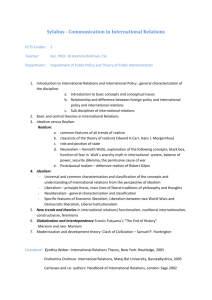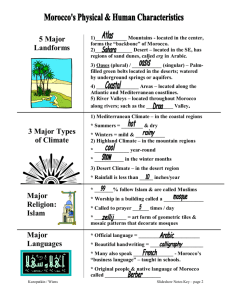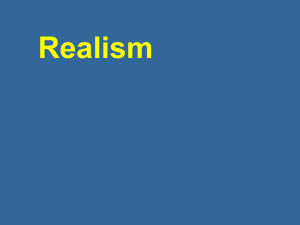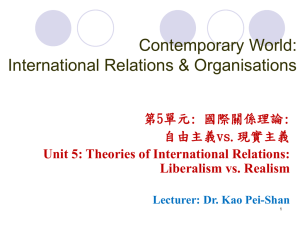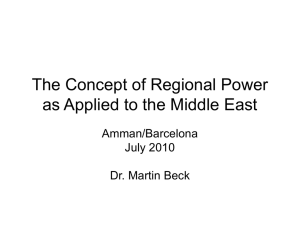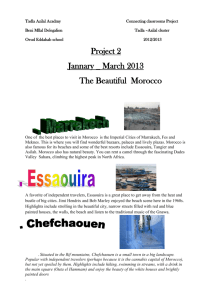International Relations Theory & The Morocco
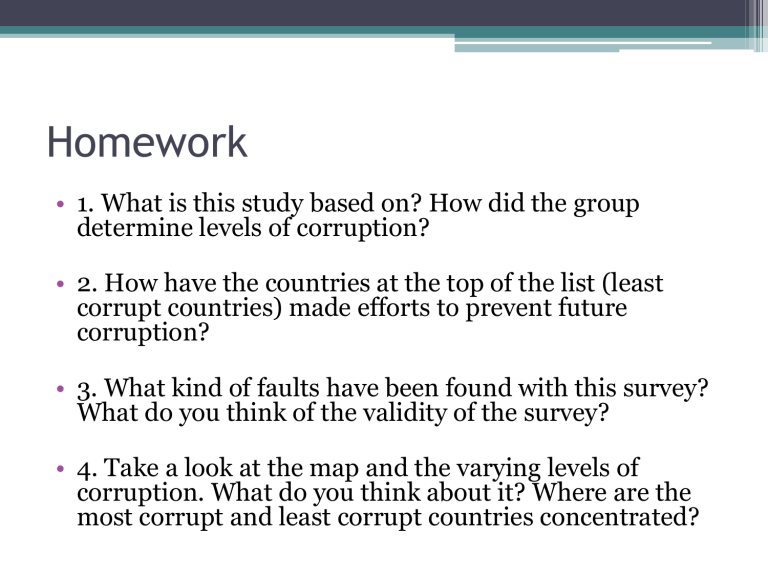
Homework
• 1. What is this study based on? How did the group determine levels of corruption?
• 2. How have the countries at the top of the list (least corrupt countries) made efforts to prevent future corruption?
• 3. What kind of faults have been found with this survey?
What do you think of the validity of the survey?
• 4. Take a look at the map and the varying levels of corruption. What do you think about it? Where are the most corrupt and least corrupt countries concentrated?
International Relations Theory &
The Morocco-UK Relationship
5/12/14
Defining basic IR terms
• State
▫ A territory where a population lives that has a permanent government which the population pays its allegiance to and which is recognized diplomatically by other states
• Theory
▫ Seeks to explain past state behavior and predict the future behavior of states
• Anarchy
▫ Not absence of rules, but absence of central government to enforce rules
Important Theories
• Realism
• Liberalism
• Constructivism
Realism
• The international system is ANARCHIC, no central government exists
• The STATE is the primary actor
• States are rational actors
▫ They advance their national interest by making rational decisions
• Power and Security are the most important
▫ Self-help world
▫ States will make decisions that help them feel secure
• Morality isn’t relevant in politics
• Zero-sum game
Realism
▫ Hegemonic Stability Theory
Based in realism
Hegemony: influence or control over another country
Theory basically argues that the international political system is most stable when one state is powerful
Realism
•
“The strong do what they want and the weak do what they must”
Liberalism
• Human nature is basically good
• Bad behavior (war) is due to inadequate social institutions and miscommunication between leaders
▫ Countries can cooperate and mutually benefit
• International organizations, like the UN and EU are central and important
• Essentially about democracy
Liberalism
• Democratic peace theory
▫ The theory posits that democracies are less likely to go to to war with each other
Ex: the U.S. and UK are both democracies, war between them is unlikely
▫ A very widely held theory
Constructivism
• “emphasizes the impact of ideas, identities, norms, and culture in world politics” –Tufts IR guide
• Materialism not important (power and trade aren’t)
Example of Constructivism
• For example, how the U.S. views an atomic bomb in North Korea is different from how it views one in the UK
▫ Materially—an atomic bomb is an atomic bomb
▫ But it takes on different meanings
▫ The U.S. reacts to social relationship differently
To North Korea, U.S. has hostile relationship, interest to resist
To UK, U.S. has mutually beneficial relationship, no interest in containing them
Videos!
• Liberalism
▫ https://www.youtube.com/watch?v=tZbDMUaqw
E8
• Realism
▫ https://www.youtube.com/watch?v=UnKEFSVAi
NQ&list=PL9122B69A0D2A0639
• Constructivism
▫ https://www.youtube.com/watch?v=kYU9UfkV_
XI
Morocco and the UK
(and applying some of those theories!)
• The two countries recently celebrated 800 years of diplomatic relations!
• In 1213- King John of England
▫ Sent 1 st embassy to Morocco
▫ Hope to make friends with Sultan Mohamed
Ennassir
Wanted his support in fighting European enemies
Which theory could describe this situation?
UK & Morocco
• Trade
▫ First trade mission by the UK to Morocco was established in 1550
▫ English traders granted special status so trade expanded quickly
▫ “In 2012, bilateral trade in goods between the two countries passed £1bn for the first time” (gov.UK)
▫ The UKTI office in Casa helps business in Morocco
▫ What would a constructivist say about trade?
British Control of Tangier
• 1661-1684
▫ Britain controls Tangier against Morocco’s wishes
Sultan Moulay Ismail fought against this
Britain eventually found it too costly to maintain
▫ Explained by realism?
Britain hope to gain territory to maintain its security
Morocco hoped to gain territory to maintain its security
Both were acting rationally, as unitary actors
18
th
and 19
th
Century Relations
• Treaties of Peace and Commerce in 1721 and
1760
• Morocco remained independent through this time period
▫ Part of this could be due to Britain’s commitment to maintaining the Kingdom, as this would protect
Britain’s interests in Gibralter
Again, a very realist view
Britain acting in its own security, keeping this relationship in order to feel secure and gain power
Relations today
• Arab Partnership
▫ 2011, UK announced its commitment to help political change happen in the MENA region
▫ 3 goals (from gov.uk)
Encourage greater political participation
Increase gov’t transparency and limit corruption
Supporting media to create democratic debate
• “British and Moroccan ministers have frequent contact on a wide range of political issues including political reform and human rights, and we cooperate in international forums like the United Nations.”
